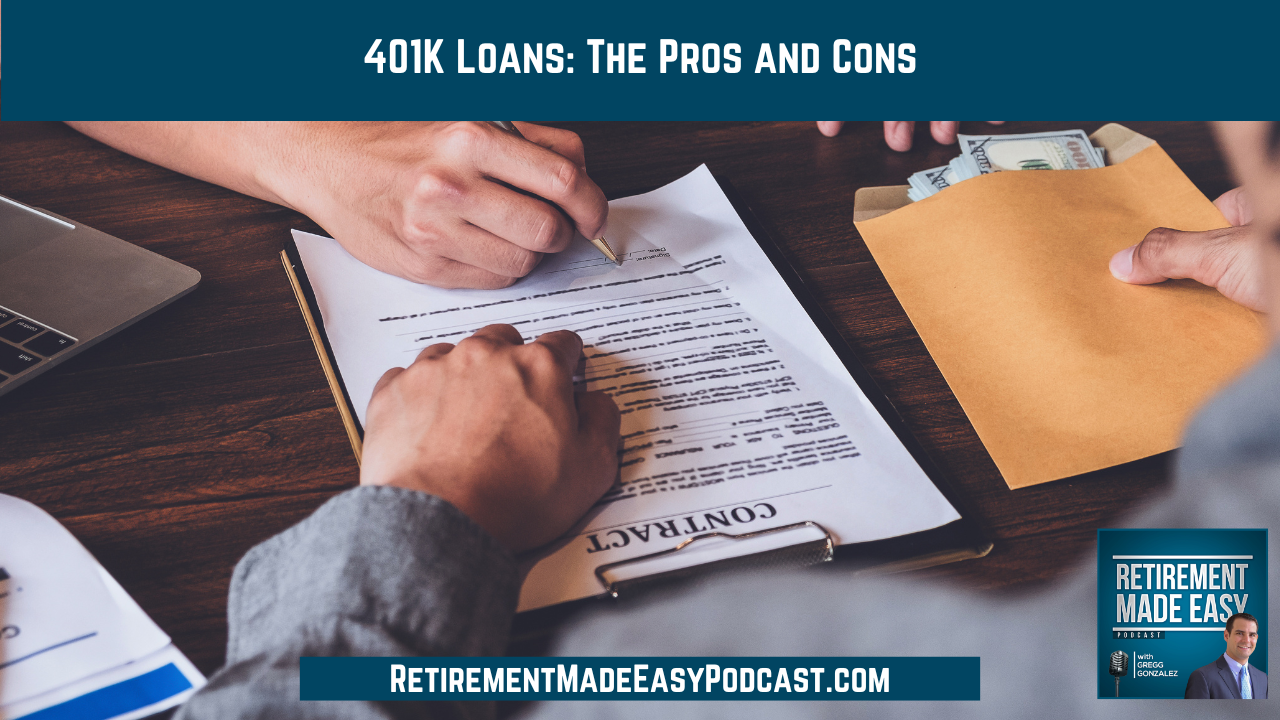
Lately, I’ve been getting a lot of questions about 401K loans and whether or not they’re worth it. People are asking things like, “How do you take out the loan? How does paying it back work? Should we ever consider it? What are our other options?”
I’m a financial planner. My job is to give you all of the information necessary so you can make informed decisions. Because at the end of the day, these decisions are yours. So, in this episode of the Retirement Made Easy podcast, I’m going to give you the full picture and let you decide.
You will want to hear this episode if you are interested in…
- [3:10] Check out our website for FREE resources
- [4:45] The basics of 401K loans
- [7:55] The risks of taking a 401K loan
- [14:06] Dipping into a Roth IRA
- [15:49] Alternatives to a 401K loan
- [19:34] Consider short-term and long-term goals
The basics of 401K loans
I want to point out that not all 401K plans are the same. Your plan summary document will tell you whether or not a 401K loan is allowed. You can also call the company that provides your 401K to verify.
For example, the 401K at my small company doesn’t allow loans. Generally speaking, the bigger the company, the higher the likelihood that they allow 401K loans.
Secondly, the loans are also limited. The loan limit is typically a max of $50,000 or 50% of your vested account balance (whichever is less). The only exception is that if 50% of your vested balance is less than $10,000, you can borrow up to $10,000.
Then, you have to pay the loan back—plus interest—through payroll payments. This is all well and good, but there are some risks you’ll want to consider.
The risks of taking a 401K loan
If you’re laid off, leave and get a new job, or retire and you’re no longer working for the employer at which you have a loan against the 401K, you have 90 days to pay back that 401K loan. If you can’t pay it back, you’ll be taxed on the entire loan balance. If you’re under 59 ½, you’ll also be hit with a 10% penalty on that money.
Very few people are lucky enough to get a severance package that they can use to pay off that debt. So you’ll have to consider if you’ll be able to pay off the loan under any of these circumstances.
Once you take 401K loans, chances are that you’ll do it again. So if you change jobs, it may be wise to roll the old 401K into the new 401K, where you can take another loan in the future instead of rolling it into an IRA.
Alternatives to a 401K loan
I believe people make better decisions when they have options. So what are some alternative options?
- A withdrawal from a Roth IRA: IRAs allow you to take a withdrawal once a year that must be paid back within 60 days without being taxed (keep in mind that if you contribute to a Roth IRA, you have to wait 5 years before you can withdraw earnings tax-free).
- A loan against a brokerage account/trust account/non-qualified account: You might be hit with a capital gains tax. However, you may be able to dip into this without taking a loan.
- A loan from a whole-life insurance policy: I might with a gentleman whose cash value was $47,000. His death benefit was $100,000. He could take a loan out on the money and pay interest on the loan.
- A home equity loan: ⅓ of the people who had mortgages after Covid took out a home equity loan. Many bought RVs, boats, and completed home improvement projects. It stimulated the economy. Now that interest rates are higher, this isn’t as common.
Get the full details on all of your options in this episode, then let me know what you think!
Resources & People Mentioned
- 3 Steps to Retirement Planning
- Check out our website for FREE resources
- The 5-year Roth IRA rule
- Episode #118: 3 Types of Accounts You Want to Have to Save for Retirement
Connect With Gregg Gonzalez
- Email at: Gregg.gonzalez@lpl.com
- Podcast: https://RetirementMadeEasyPodcast.com
- Website: https://StLouisFinancialAdvisor.com
- Follow Gregg on LinkedIn
- Follow Gregg on Facebook
- Follow Gregg on YouTube
Subscribe to Retirement Made Easy
On Apple Podcasts, Spotify, Google Podcasts
Connect With Gregg Gonzalez
- Email at: Gregg@RetireSTL.com
- Podcast: https://RetirementMadeEasyPodcast.com
- Website: https://StLouisFinancialAdvisor.com
- Follow Gregg on LinkedIn
- Follow Gregg on Facebook
- Follow Gregg on YouTube



